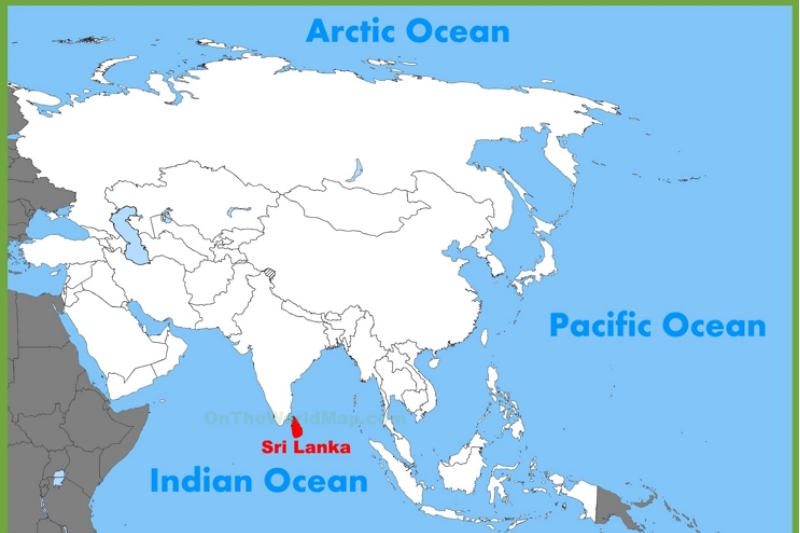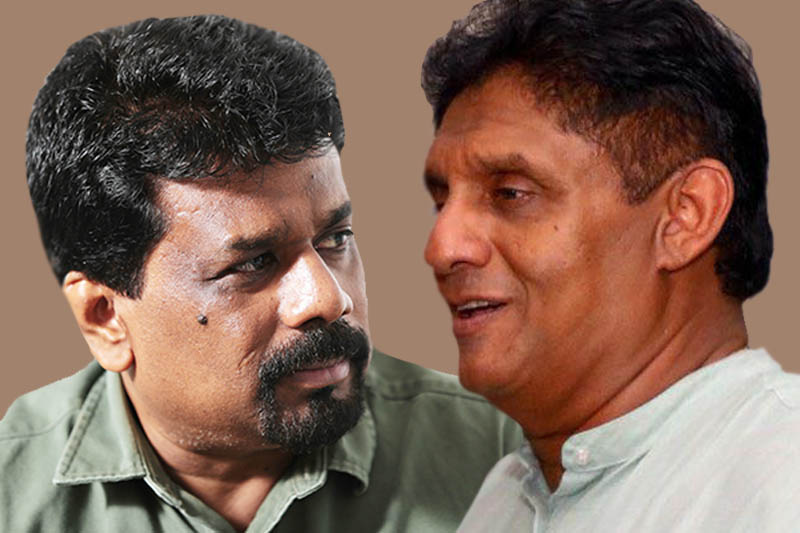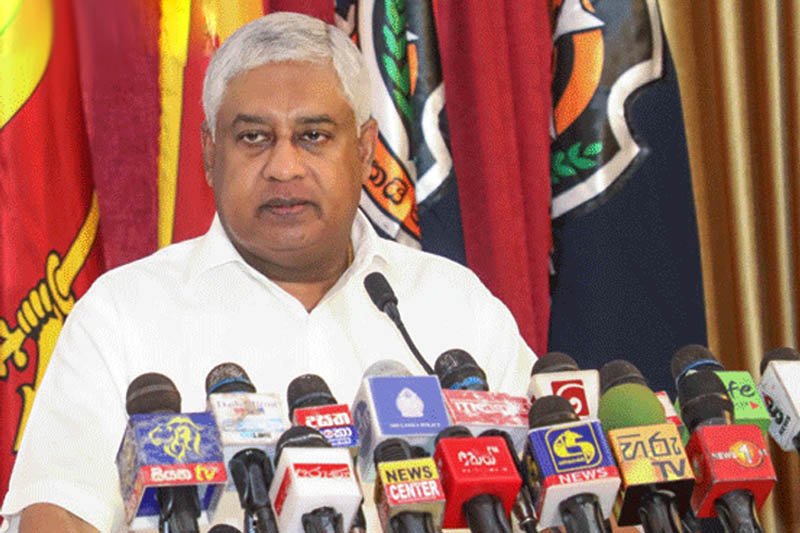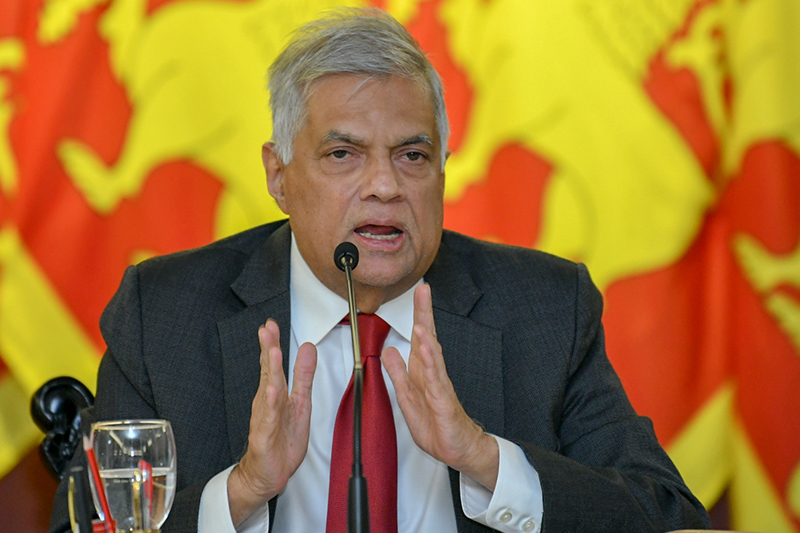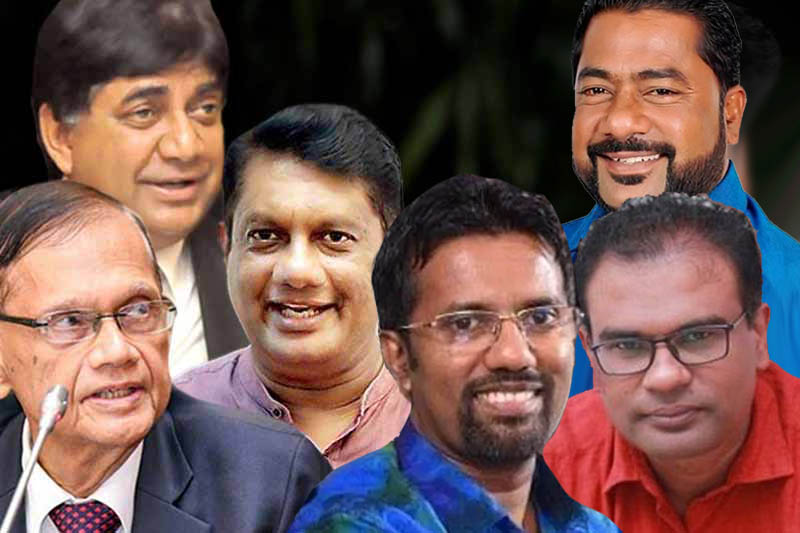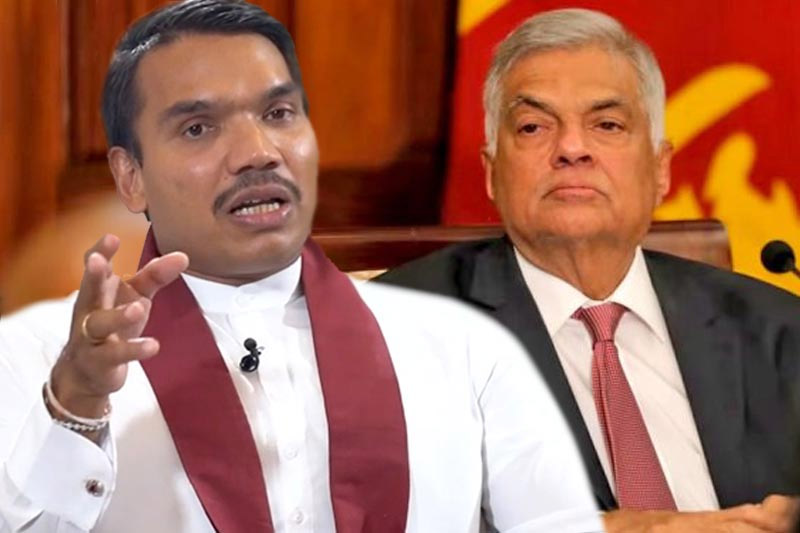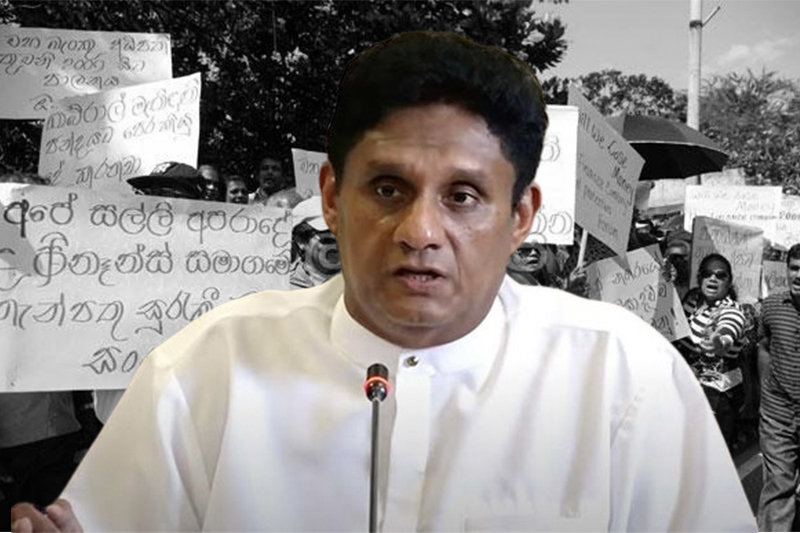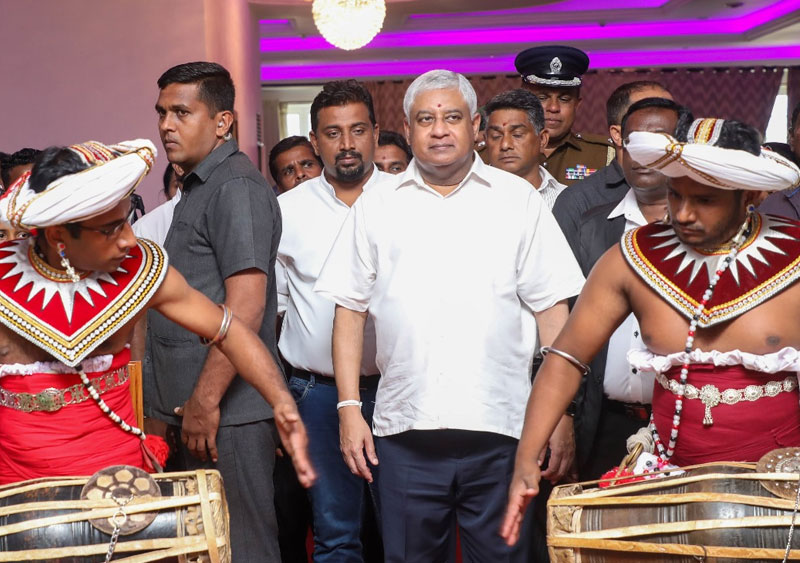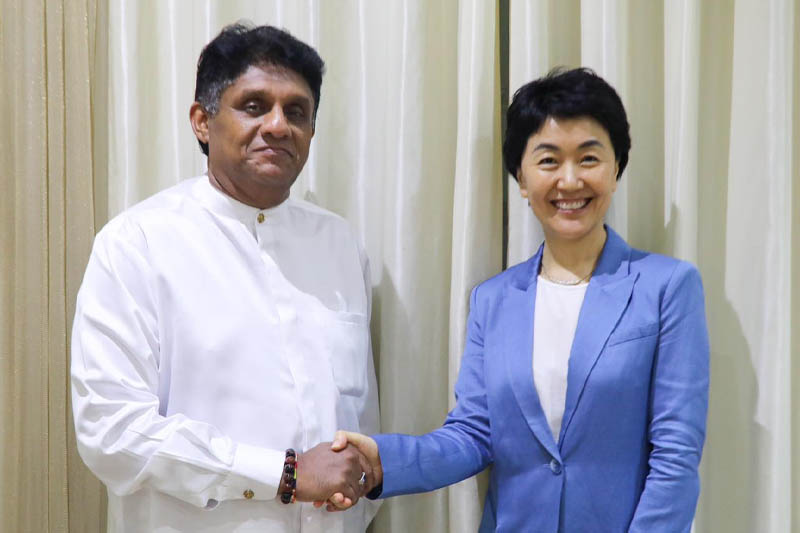Sri Lanka is slowly emerging out of a period of unimaginable turmoil and incertitude. It faced the worst economic crisis since its independence, as it was hit with severe fuel, food and medicine shortages, crippling debt, negative growth, skyrocketing inflation, and dwindling foreign exchange reserves.
Though a preliminary agreement known as a ‘staff-level agreement’ has been reached with the International Monetary Fund (IMF) to obtain US$2.9 billion under the Extended Fund Facility (EEF), this is only a small and humble first step towards dealing with Sri Lanka’s political economy challenges which are multifarious and inherently intertwined.
As the crisis threatens to return, Sri Lanka is looking up to big-ticket creditors for space to manoeuvre.
The IMF bailout - Not a panacea
As this island nation that has not successfully recovered from the pandemic, (having suffered massive income losses and high nutrition shortfall), tries to find its way back onto the road to recovery, its President and Finance Minister Ranil Wickremesinghe recognises that the IMF bailout will not address all of Sri Lanka’s problems.
The bailout first needs to be approved by IMF’s senior management, and the funds are not likely to be available for several months. Harin Fernando, Sri Lankan Minister for tourism in an interview indicated that they expect “the IMF bailout will start coming to Sri Lanka early part of next year.”
As the crisis threatens to return, Sri Lanka is looking up to big-ticket creditors for space to manoeuvre.
IMF bailouts are generally guided by the country’s financing needs, its capacity to repay as well as its past track record of using IMF resources. Given that this is Sri Lanka’s 17th IMF programme in seven decades, the organisation will no doubt use this crisis to push for long-term structural reforms. The IMF explains that “when a country borrows from the IMF, it commits to undertake policies to overcome economic and structural problems.”
Compared to assistance given under a Stand-by Arrangement, the EEF is distinct in its long-term approach. ‘Longer engagement and longer repayment period’ than other IMF arrangements, the EEF focuses on structural reform.
Established with the view to help countries that are experiencing slow growth or balance of payments difficulties directly linked to structural impediments, the EEF will include specific conditions and major policy reform.
Only time will reveal the nature and stringency of the conditions attached to the bailout but without proper social safety net programmes in place, it will likely have an adverse impact on the daily lives of the Sri Lankan people. As Wickremesinghe rightly warned the public, things will get much worse before they get better.
Exploring alternatives
Although obtaining the funds from the IMF as early as possible is absolutely crucial, Wickremesinghe is not wasting time solely relying on the bailout to solve the current crisis. Instead, he is exploring alternatives, both short and long term, by reaching out to bilateral partners, reflecting the continued importance of bilateral diplomacy in international relations.
Perhaps, it also reflects the tendency in international relations for smaller nations to balance power. At the heart of the balance of power doctrine is a desire to maintain independence in the face of over-dependence.
Knowing that the EEF will give the IMF deep influence in shaping Sri Lanka’s economic policies for several years to come, Wickremesinghe hopes any additional and alternative financing might ensure quicker repayment and perhaps more flexibility.
Only time will reveal the nature and stringency of the conditions attached to the bailout but without proper social safety net programmes in place, it will likely have an adverse impact on the daily lives of the Sri Lankan people.
Very early on, Wickremesinghe signalled his preference for financial assistance through an international aid consortium and indicated having discussions along these lines with foreign envoys.
Following this, he said in parliament “We need the support of India, Japan, and China, who have been historic allies.” Sri Lanka it can be observed has been reaching out to all its partners.
India’s Support: Much appreciated
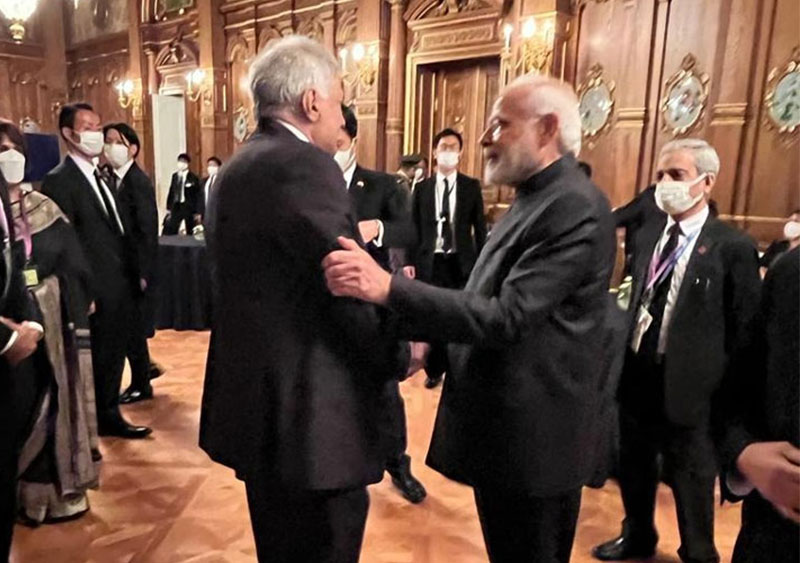
President Ranil Wickremesinghe and Indian prime minister Narendra Modi have held informal discussions in Tokyo on the sidelines of the funeral of former Japanese prime minister Shinzo Abe
The extent of India’s financial assistance and support towards Sri Lanka through loans, loan deferments, credit lines, and currency swaps, notably in the early months of the economic crisis has not gone unnoticed.
Appreciation for India’s help has been from across the political spectrum. Wickremesinghe has repeatedly acknowledged India’s timely assistance and Opposition leader Sajith Premadasa too said, “India has played a very crucial role, especially at this critical juncture… India has come forward and supported us.”
India’s Ministry of External Affairs said that to ameliorate the economic situation in Sri Lanka, New Delhi extended US$3.8-billion support. Despite their geopolitical competitiveness in Sri Lanka, China too noted that “the Indian government made great efforts…” and expressed their willingness to work with India and other members of the international community.
However, the recent spat surrounding the docking of Yuan Wang 5 at Hambantota Port in Sri Lanka has added some strain and complexity to the political dynamics between these countries.
China’s focus: To advance BRI projects and speed up FTA
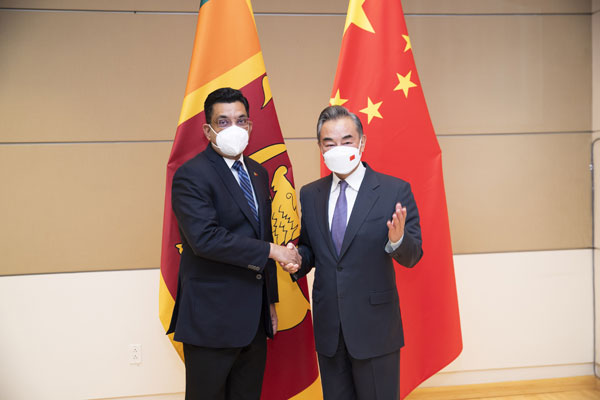
Sri Lankan Foreign Minister Ali Sabry and Chinese Foreign Minister Wang Yi
On the sidelines of the United Nations General Assembly (UNGA) in New York in September, Sri Lanka’s Foreign Minister Ali Sabry met his Chinese counterpart, Wang Yi.
Yi said that China and Sri Lanka are “each other’s strategic cooperative partners” and that the two countries “have always shared weal and woe and sincerely helped each other”. Yi went on to mention that this year marked both 65 years of diplomatic relations and the 70th anniversary of the signing of the Rice-Rubber Pact, considered a landmark treaty by both countries, and often referred to by Sri Lanka as the most useful, most durable and successful agreement.
China’s preferred approach towards Sri Lanka’s economic recovery appears to be, either to help through the framework of the Belt and Road Initiative (BRI) and its flagship projects such as Hambantota Port and Colombo Port City or through to advance trade.
A statement on China’s Ministry of Foreign Affairs website, (said that the “so-called China’s ‘debt trap’ claim is an entirely groundless rumour” and that “certain countries created and spread the narrative of ‘debt trap’.” It went on to state that “Sri Lanka welcomes investment from all countries including China.”
However, despite the overall narrative of mutual understanding and continued support for each other, (apart from the US$74 million in humanitarian assistance already offered), it appears China has not committed anything concrete in terms of financial assistance at this meeting.
Instead, the statement simply noted, “China has provided medicines, rice, fuel and other emergency humanitarian assistance to Sri Lanka, and will continue to offer assistance within our capacity to help Sri Lanka overcome temporary difficulties.”
China’s preferred approach towards Sri Lanka’s economic recovery appears to be, either to help through the framework of the Belt and Road Initiative (BRI) and its flagship projects such as Hambantota Port and Colombo Port City or through to advance trade. In this regard, China is focused on trying to “speed up negotiations on a free trade agreement and strive to reach a deal at an early date, so as to inject strong confidence and stable expectations into economic and trade cooperation.”
Japan: Willing to take the lead
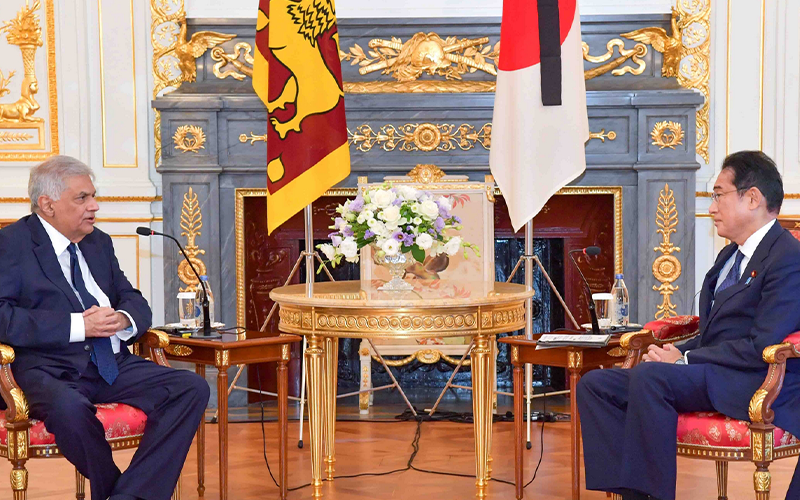
President Ranil Wickremesinghe with Japanese Prime Minister Fumio Kishida at Akasaka Palace in Tokyo
Meanwhile, Wickremesinghe was on an official visit to Tokyo to attend former Japanese Prime Minister Abe’s funeral, where he met incumbent Fumio Kishida and other high-ranking officials. Wickremesinghe asked Japan to play a leading role in negotiations with creditors and Japan’s Foreign Minister Hayashi expressed his country’s willingness to do so.
Wickremesinghe further voiced regret over the breakdown of relations between their countries mainly owing to the cancellation of various investment projects under the previous Gotabaya Rajapaksa-led government.
Signalling a new era of cooperation, he further indicated his keenness in restarting those projects. Japan has offered Sri Lanka humanitarian assistance of US$3 million and an additional US$3.5 million is reportedly underway.
While Yi in his meeting with Sabry highlighted the importance of the BRI projects in Sri Lanka’s recovery, Prime Minister Kishida used the opportunity of meeting Wickremesinghe to convey his hopes of strengthening bilateral relations by working “toward the realisation of a Free and Open Indo-Pacific in this year that marks the 70th anniversary of the establishment of diplomatic relations between Japan and Sri Lanka.”
In addition to reaching out to Sri Lanka’s bilateral creditor-nations, Wickremesinghe has made official visits to the United Kingdom (UK) and the Philippines and reached out to several international organisations.
In the UK, he also met the Sri Lankan diaspora at a meeting organised by the Sri Lankan High Commission in the UK and encouraged them to help Sri Lanka by looking at new investment opportunities.
Looking ahead
The road to economic recovery will be a long and arduous one. The IMF bail-out when it becomes available will undoubtedly come with many stringent conditions, both explicit and implicit.
Although desperately seeking alternative and/or additional financing, Wickremesinghe ultimately accepts that, “whether the IMF proposal is good or bad, whether anyone likes it or not, it should be implemented to recover from the present economic crisis the country is facing,” whilst adding “the government had the right to question the proposals if there was cause for concern.”
The IMF has made it clear that financial support is dependent on the willingness of creditors to reach a collaborative agreement. China, India, and Japan being the main creditor-nations will need to agree to rescheduling and restructuring repayment.
Whilst India and Japan appear willing to support Sri Lanka’s plans with the IMF, China has been persistent in its preference for refinancing over restructuring. Sri Lanka will not be able to get out of this crisis without China’s willingness to help.
Whilst President Wickremesinghe has said, the country should focus on the foreign debt issues “without getting caught into the geopolitics of the Asian region”, this will prove to be challenging.

